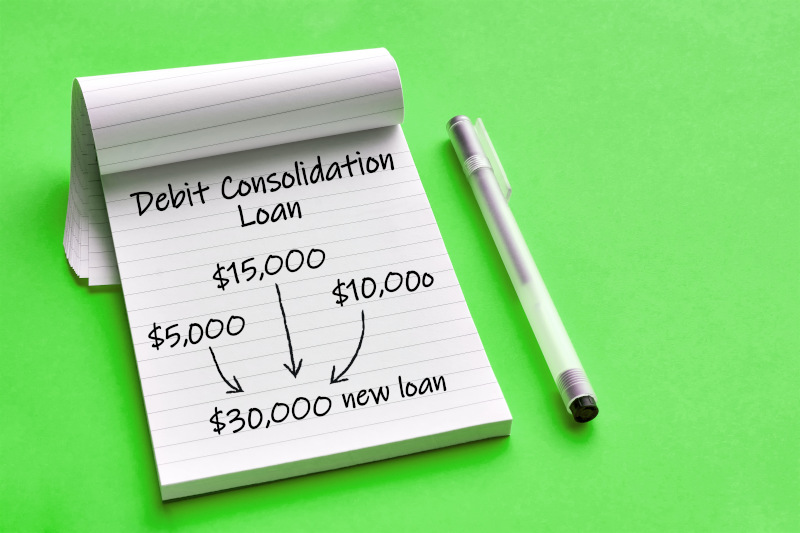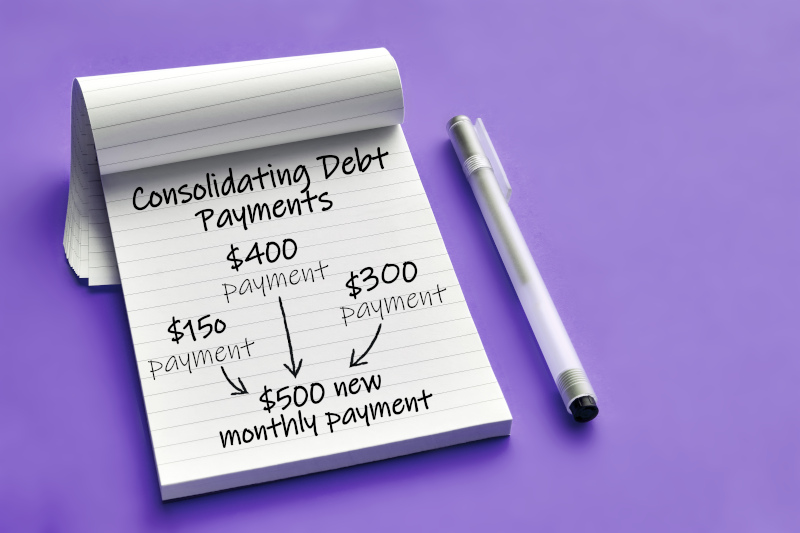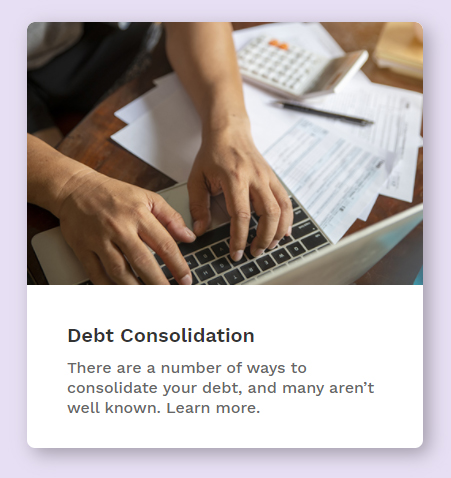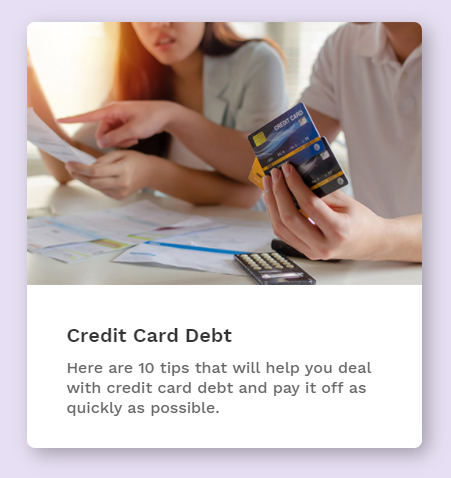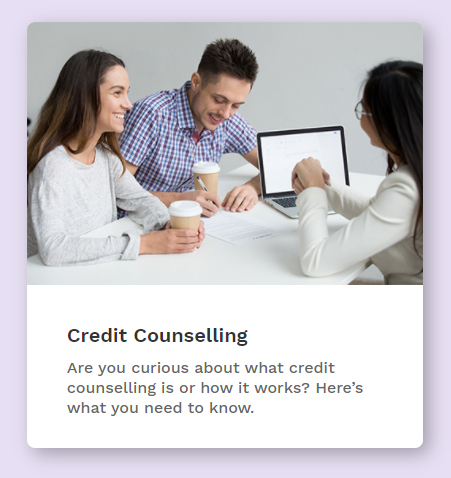Most Effective Debt Consolidation Loans & Programs
When you’re struggling to pay your many credit cards, bills, and possibly a line of credit or overdraft, it can make a lot of sense to get a debt consolidation loan or look into some debt consolidation programs and see which of these would work out best for your situation. Debt consolidation can be a great way for a lot of people to effectively and successfully deal with their debts. Today it exists in a number of forms. Some protect your credit rating while others do not. Some can give you a break on interest or even reduce the amount of debt you owe while others do not. Here are some things you really need to know:
What is Debt Consolidation?
To understand what debt consolidation is, think of what the words mean: you know what “debt” is, and to “consolidate” means to put things together. With debt consolidation you would either put all your debts together or all of your payments together and go forward making one payment each month. So if you have a credit card debt for $15,000 and an overdraft balance of $5,000 and a bank put these debts together into one new loan, you’d then have a new, combined, consolidated debt of $20,000. The other way consolidation could work is instead of making minimum payments on these two original debts of say $450 and $150 per month, the payments could be consolidated under a debt consolidation program and result in a new monthly payment of only $335 and both debts would be paid off in 5 years.
So then the next questions are how does this all work, followed by what are the pros and cons of each option, and which one would be best for me?
There is no one-size-fits-all way to consolidate your debts. There are many different options and choosing the right one depends on your overall financial situation. Your options fall into two main categories:
- Borrowing money to pay off your current debts. This is typically called a debt consolidation loan; although, you can also do this with a mortgage or line of credit.
- Using existing funds in your monthly budget to pay off what you owe. You could call this consolidating payments. It’s how debt consolidation programs work.
Borrowing Money to Pay Off Debts – A Traditional Debt Consolidation Loan
Borrowing money from a bank or credit union is normally what most people think of first when they look into debt consolidation. This is called getting a debt consolidation loan. When you borrow new money to pay off existing debts, you or your lender take the new money that you borrowed and pay off each of your other debts. Then going forward, you make payments to the one new loan rather than to each of your old loans or creditors (as each of them has been paid out by the new loan).
Pros: You only have one loan to pay each month, typically at a lower interest rate than what you were paying to each creditor before. With your first consolidation loan, the impact to your credit rating can turn out fairly positively once you’re well on track to being debt free. Benefits, however, can decrease with subsequent loans.
Cons: It’s fairly normal for people who pay off credit cards or a line of credit with a debt consolidation loan to continue using these old credit accounts as they used to and rack up new balances. For a lot of people, this can effectively double their debt. So instead of getting ahead using a debt consolidation loan, they actually fall further behind and are worse off for having taken out a debt consolidation loan.
Another downside of applying for a debt consolidation loan is that the lenders you approach may require collateral, a co-signer, or only be able to offer you a higher interest rate on the loan than you are already paying on the debts you want to consolidate. If your credit isn’t strong enough or your income isn’t high enough, lenders could also say no too.
Consolidating Payments to Pay Debts Off – Debt Consolidation Programs
When borrowing money to consolidate your debts isn’t the right option or isn’t an available option, you can look at amalgamating your payments rather than your debts. There are several options available to do this, ranging from a Debt Management Program offered by non-profit credit counselling organizations to legal options such as an Orderly Payment of Debts (only available in Alberta and Nova Scotia) or Voluntary Deposit (only available in Quebec). Two additional legal options are only available through Licensed Insolvency Trustees: a consumer proposal and bankruptcy. It’s important to bear in mind that for all of these options having a realistic budget is critical because the money to make your payments on all of these programs comes from your pay cheques. You don’t borrow additional money so there is no new loan.
Get an overview of all debt relief options available in Canada
Pros: You don’t borrow any more money, you receive support to create a budget that works, and once you’ve paid off all of your debts, you can re-establish your credit rating. The Debt Management Program is completely private and confidential. Only you, the credit counselling organization, and your creditors will ever know about it. It also either eliminates or substantially reduces all interest on your debts.
For the legal options, protection is provided from your creditors, and a structured, framework is provided for ensuring all your debts are paid off within 5 years. With the Orderly Payment of Debts and Voluntary Deposit programs, all interest rates are reduced to 5%. With a consumer proposal, all interest is eliminated and lower debt balances can be negotiated. Bankruptcy of course results in all unsecured debts being repaid as a fraction of what was originally owed.
Cons: All of these debt consolidation programs will impact your credit while you are on them. The impact of some of these programs such as a consumer proposal or bankruptcy can be significant. However, some of these programs allow your credit to recover quickly two to three years after the program ends. Not all organizations that offer these programs provide excellent budgeting help or assistance if financial problems arise while you’re on the program. Another downside to the legal programs is that they result in a permanent record with the courts. However, the Debt Management Program doesn’t suffer from this because it is run outside the courts.
One of the most positive outcomes of debt consolidation programs, especially with a non-profit agency, is that you learn new money skills and develop new money management habits that set you up for success in the years to come.
How to Make Either Debt Consolidation Loans or Programs Work for You
If you choose to use a normal debt consolidation loan, make sure to avoid falling into the trap of using repeated loans to deal with your debts. Instead, create a budget, set financial goals, and work step-by-step to get back on track and stick to your goals. If you’re interested in learning more about debt consolidation programs, contact a non-profit credit counselling organization, like us, and one of our credit counsellors can help you explore all your options. Taking the time now to make a good, informed decision will provide you with the stable financial future you need to look forward to home ownership, investing, or even a comfortable retirement.
Last Updated on April 21, 2025
